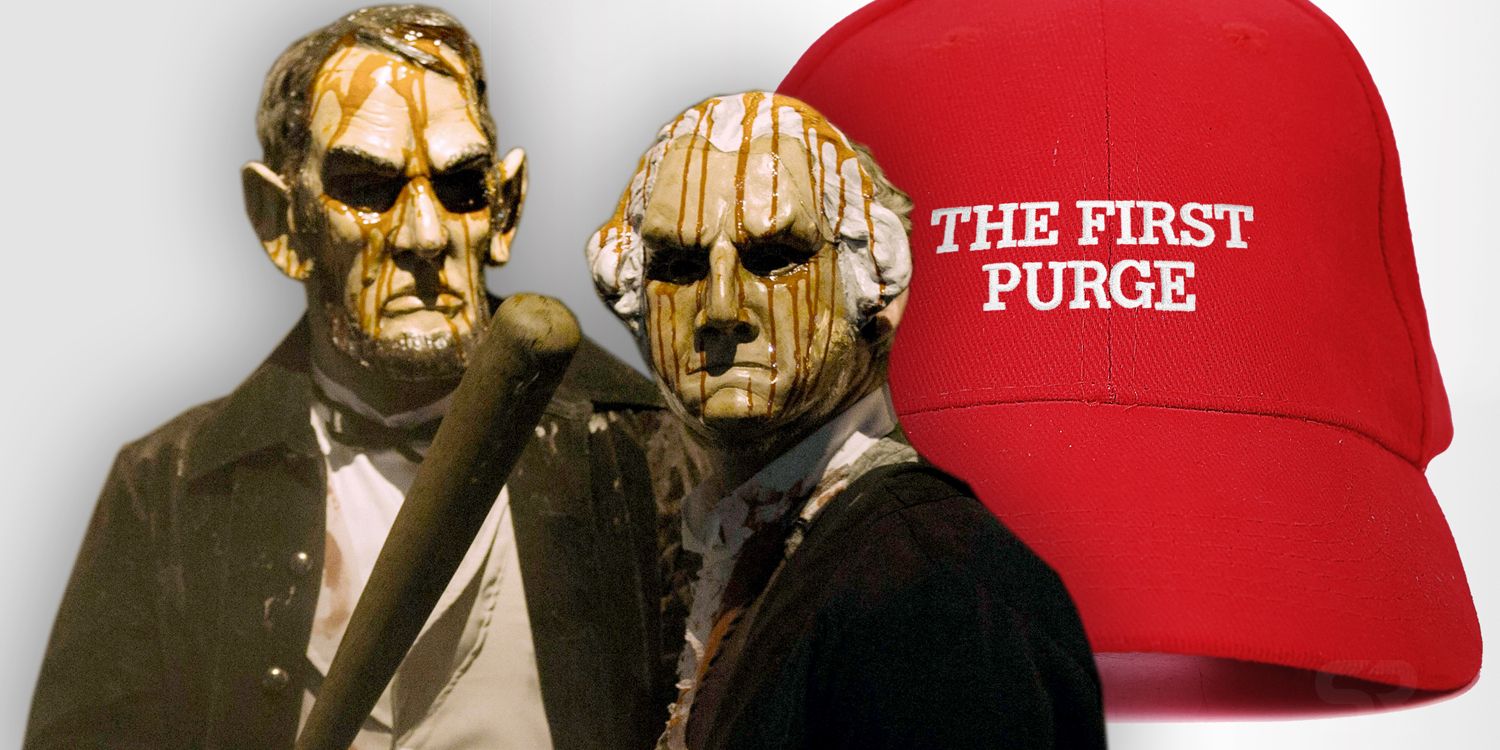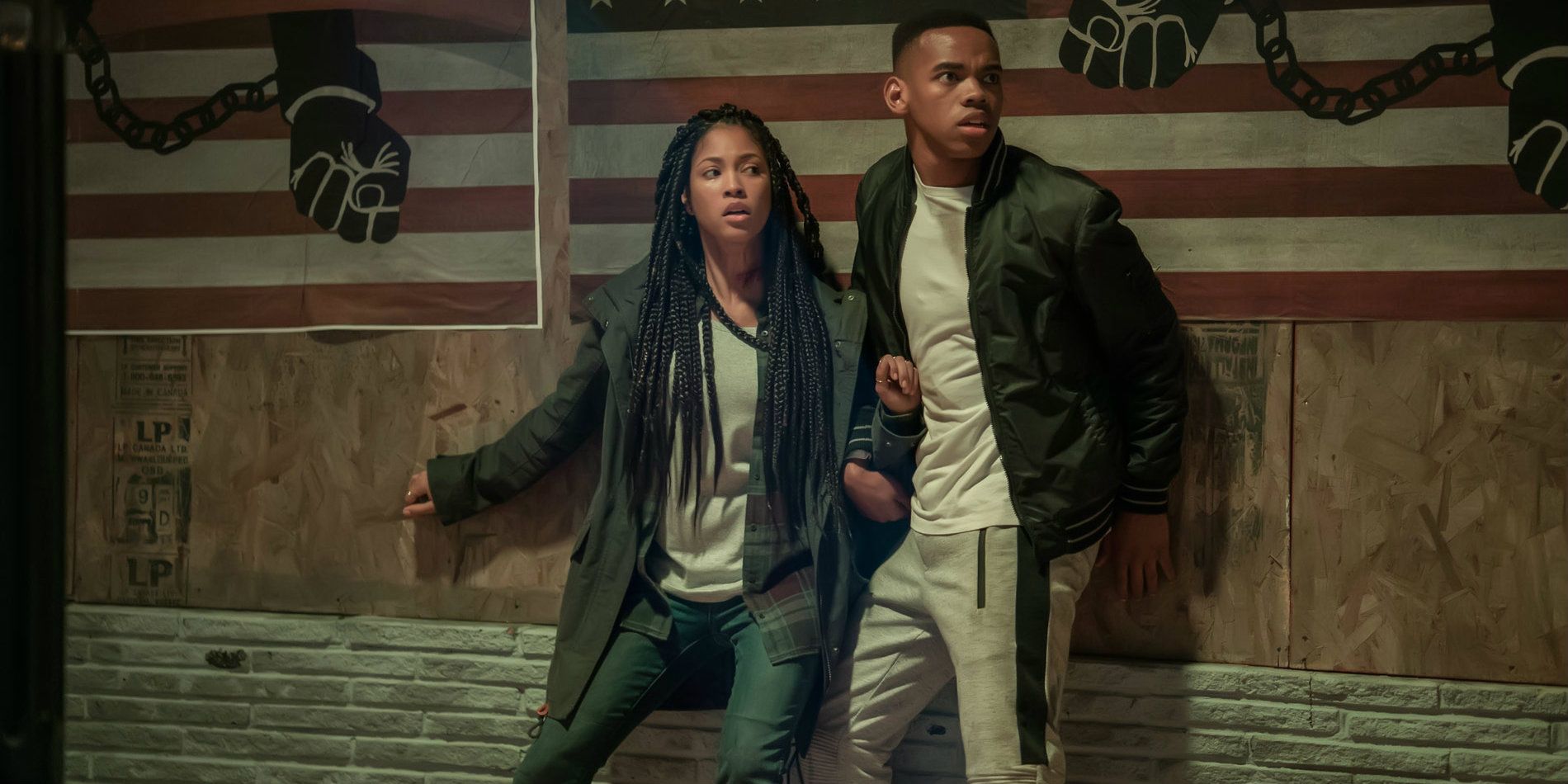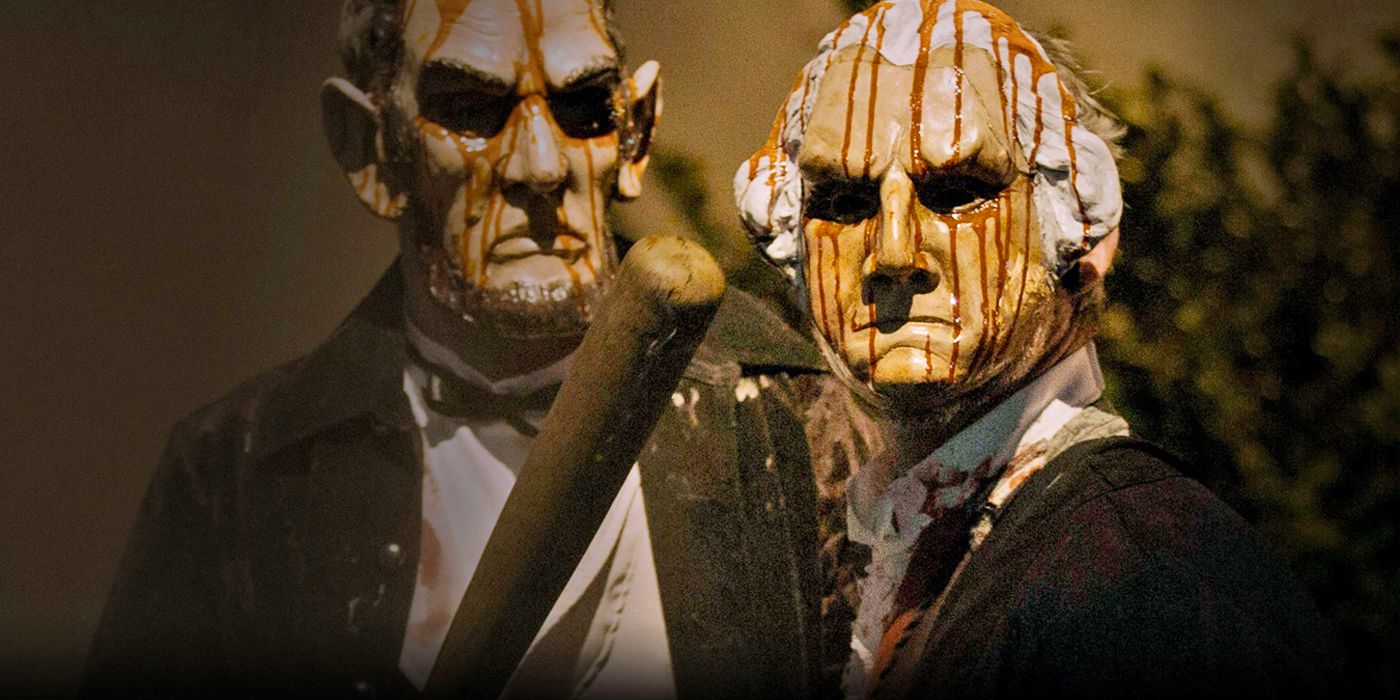The following includes SPOILERS for The First Purge and other Purge films.
The First Purge may just be the first proper anti-Trump action movie produced. It's no secret that, despite having built his 21st Century fame by reworking his 1980s image as a quixotically-ruthless businessman in the world of reality television, U.S. President Donald Trump seems to have relatively few fans in the entertainment industry. But despite ongoing vocal opposition to many of his administration's controversial policies by politically-active actors, filmmakers and other Hollywood professionals, few major films have taken direct thematic aim at the modern state of American politics apart from one-off jokes, oblique references or plot-points that likely only required minor tweaks to make them more (or less?) relevant than they would've been otherwise.
That streak appears ended, appropriately enough, as of July 4th with the wide release of The First Purge, a prequel to the moneymaking horror franchise that effectively positions itself as the first real anti-Trump action movie.
Related: Read Our Review Of The First Purge
A dystopian near (alternate) future bloodbath depicting a citizen resistance against the machinations of a hostile fascist government that has seized control of the United States, it frames its villains, heroes and their respective ideological-alignments as explicit, unmistakable parallels to supporters and opponents of the current American Presidential regime. Moreover, it seems to suggest that the world of The Purge - a state-endorsed "holiday" where all crime including murder is legalized for 12 hours - is something like what's waiting for the real world.
- This Page: How The First Purge Uses Trump As Inspiration
- Page 2: What The Purge's Trump Evolution Really Means
MAKE AMERICA PURGE AGAIN
In the practical sense, it's not too surprising that it took just over 500 days of a Presidency even as unprecedentedly controversial as Trump's to generate a cinematic rebuke of this type. Outrage is immediate but moviemaking takes time and, as a result, politically-themed films often aim to tackle longstanding "big issues" or try to anticipate where the world will be - often to mixed results. Last year's Jessica Chastain anti-gun legal thriller Miss Sloane was noted by many to have felt written in anticipation of reflecting the realities of a presumed Hillary Clinton Administration, while the Dave Bautista action film Bushwick imagined a diverse Brooklyn neighborhood fighting off invasion by Texas after the Lone Star State secedes from the "liberal" U.S. Even the previous Purge movie, Election Year, directly paralleled the 2016 Clinton/Trump election for its storyline... but assumed a different ending than the one reality delivered months later.
That may or may not be why The First Purge takes the prequel route (the other reason, as those who stick around through the credits will discover, is to set-up a Purge TV series that will take place in mid-continuity), but whatever the impetus the film makes no pretense to playing coy about its inspirations or its message. The early (because it's a prequel) incarnation of the New Founding Fathers government and their tacky propaganda are designed to resemble Trump, Fox News and GOP campaign aesthetics, with paeans to "family values", the Evangelical Right and "restoring" a somehow lost vision of America. We're told that they were put into power by voters frustrated with "both parties" - but they were pushed over the top by support from the NRA and rather than fighting for the economically-disenfranchised their big plan is to manipulate the violence of Purge Night to goad the lower-classes into killing each other off... certain colors of "lower class" specifically.
That's the other place where the film opts to play things right upfront when it comes to message. The idea that the NFFA government is racist (in the White-supremacist flavor) in addition to nondescriptly theocratic has been barely-concealed subtext in all three prior Purge movies (the series has always been political and never subtle about it), but previous installments had featured either White protagonists (the original) or a set of supporting characters of mixed races (The Purge: Anarchy and Election Year).
Related: Jurassic World 2 Gets Some Jabs In Against Donald Trump
Not so The First Purge. The protagonists are all Black and Latino residents of locked-down Staten Island neighborhood where the trial-run Purge experiment is being staged, the government-backed murder squads they find themselves battling include Klansmen, White-nationalists and Blackwater-style mercenaries - at one point, an unnamed gang in white polo shirts bearing torches and "Alt-Right" symbol-shields even make an appearance.
Page 2 of 2: What The Purge's Trump Evolution Really Means
How The Purge Evolved In Fraught Political Times
Indeed, The First Purge officially features more callbacks to President Trump's infamous "Grab `em by the p***y!" scandal (one) than it does heroic White people, which in some respects could be the most radical thing about it from a Hollywood casting standpoint. Like most political satire, the allegory gets darker the closer you believe it to be to the real thing its satirizing. A film where the subtext appears to be "This is America under the current Presidency" while the text is a story about how an oppressed class can survive and fight back against a government that's actively trying to exterminate them is not a film that can be wishy-washy about message and keep its integrity, and The First Purge isn't content to simply dress its villains in the trappings of its political enemies. It also has a message for its own "side," one of hope... but also of rage.
The main good guy storyline divides perspectives between community activist Nya (Lex Scott Davis) and her ex-boyfriend Dimitri (Y'lan Noel) a powerful/wealthy neighborhood gang leader. He offers her protection in his secure hideout, but she aims to wait out a non-violent protest against The Purge in a local Church instead. When things go south (the prequel's big conceit is that the Staten Island residents don't all slip into murder-mode given the chance and just throw parties instead, so the NFFA sends in killers to make it happen) all but a handful of those in the Church are massacred by White-supremacists, while Noel's gangster - on realizing the NFFA's real scheme - organizes his lieutenants and foot-soldiers (and their substantial arsenal) into a militia and orders them to defend their neighbors from the government. And if the "sometimes, the only option is to fight back" message still seems too subtle, at one point Dimitri strangles a villain wearing a minstrel blackface mask to death with his bare hands.
Related: The First Purge's Halloween Easter Egg Creates A Plot Hole
That's definitely a far cry from the original Purge in 2013, where all that worldbuilding and political allegory setting up what The Purge was and how it worked was mainly an excuse to stage a standard-issue home-invasion/slasher thriller centered on an upper-middle-class White suburban family without having to worry about why nobody calls the police. The Purge: Anarchy and Election Year, seemingly in response to criticism of the original's odd choice of focus, put the action on the streets and the focus on poor and working-class folks more directly-targeted by The Purge itself, with Election Year featuring a female Presidential candidate running on a platform of dismantling the "holiday" once and for all. That a franchise can evolve from vaguely-topical potboiler to "Get in the streets and resist!" agitprop in only five years is, if nothing else, revealing of the times.
What The Purge Series Is Really Saying
As noted above, films and filmmakers having something to say about the state of the political world is nothing new. Any narrative work is going to have a point to either agree or disagree with, and most modern schools of thought on the matter agree with variations on the old axiom that everything either has a "political dimension" or can be framed in the context of one. The time required to not only make films but get a handle on what one wants a film to say can, and often does, slow the pace at which incendiary works hit the big screen (it took five years after 911 for both World Trade Center and United 93 to reach theaters, and those were seen as largely uncontroversial, patriotic features in the U.S.) but if there's something to be said, eventually a filmmaker is going to want to say it.
Related: The First Purge's Mid-Credits Scenes Explained
The First Purge never mentions Donald Trump by name (and indeed takes place in a timeline where his Presidency doesn't exist) but no one with even cursory familiarity with the U.S. political zeitgeist is going to mistake what the film is trying to say about the real world its audience is going home to. It's likely to draw both positive notices and angry condemnations for that - indeed, a recurring cornerstone of the President's support has been the idea that "his" voters are somehow the marginalized ones because so much of entertainment culture disagrees with their ideological views. But like it or not, its highly unlikely The First Purge will be the last big Hollywood movie to make knocking the Trump administration part of its thematic core.
In about a month, Spike Lee's hotly-anticipated buddy-cop biopic BlacKkKlansman will hit theaters, already drawing controversy for a trailer that pointedly included a scene reminding audiences that the Trump campaign's "America First!" slogan originated with The Klan. Michael Moore has his own Trump documentary in the pipeline, provocatively titled Farenheit 11/9. Those are films known upfront to be heavily politicized, but as The First Purge demonstrates any film can carry a message and the one that gets people riled up can come from anywhere. In the Trump era, political anger has permeated every facet of pop-culture - the only surprise about seeing it at the movies is that it didn't get here sooner.




